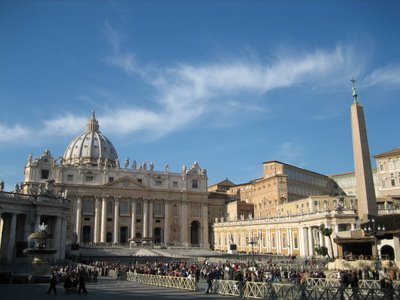The Pope and the Cardinal: Hamilton on climate ethics and the Catholic Church
"Simple principles and a modicum of self-sacrifice can slice through the most difficult ethical tangles. The simple principles are known; the only thing missing is a little selflessness or even enlightened self-interest. So the big question to ask is why it has been in such short supply?
"I think there have been a number of factors at work. Let me here comment on two of the most telling, leaving aside the exercise of brute political power by fossil fuel corporations.
"First, there is the intensely materialistic nature of affluent societies like ours. In societies where consumerism reigns, people's identities become bound up in how much and what they consume. In these circumstances it becomes easy for opponents of measures to cut carbon emissions to frighten people into thinking they may have to adjust their lifestyles, or make significant sacrifices, for then it seems like a threat to their sense of self. So the psychological pressures of consumerism come into conflict with our desire to be good citizens. Each time an Australian political leader responds to the public demand to "do something" about climate change, he or she attracts resentment and is punished. Most Australians want symbolic actions that make them feel good about themselves but which have no discernible effect on their way of life.
"The second source of moral corruption is the influence of those who repudiate the science of climate change. They portray themselves as "sceptics," but they are more accurately described as deniers. A sceptic is one who carefully filters received knowledge to see which propositions stand up to independent scrutiny. But one thing we immediately notice about the contributions of climate 'sceptics' is the absence of a quizzical, thoughtful approach. Among those who debate the science of climate change they are the ones who profess to be most certain, insisting vehemently on the falsity of the claims of climate scientists and convinced of the correctness of their own opinions."
- Clive Hamilton, The church and the ethics of climate change.
H/T Peter Lockhart.
Clive Hamilton's contributions to climate ethics are always worth reading, and the other book he quotes in this article (A Perfect Moral Storm by Stephen Gardiner) is also a quality piece of work, filled with a sensitivity to our capacity to fool ourselves. All too quickly, we subvert our moral responsibilities in ways that serve our self-interest, a process that Gardiner terms "moral corruption". This is especially true in all kinds of interesting ways with regard to climate change. Such self-serving delusions come as no great surprise to anyone familiar with the holy scriptures. Gardiner's attentiveness to this tendency is the kind of sensitivity that Christian belief and practice ought to inculcate. I'm not sure of Gardiner's religious convictions or background, but his insights here are excellent.
Hamilton takes Gardiner's observations but wants to deny that they form any kind of convenient excuse. While the details of responding well to climate change are incredibly complex, the basic outline of who is responsible to take the lead in addressing it has already been clearly drawn by international negotiations. Therefore, our collective paralysis cannot be blamed purely on the complexity of the ethical disputes. And here, Gardiner's insights into moral corruption are highly appropriate.
What both Hamilton and Gardiner lack is a compelling account of how we are to deal with our moral corruption (though, to be sure, they both have insights to offer on this as well), let alone how to live amongst a morally corrupt people.
















